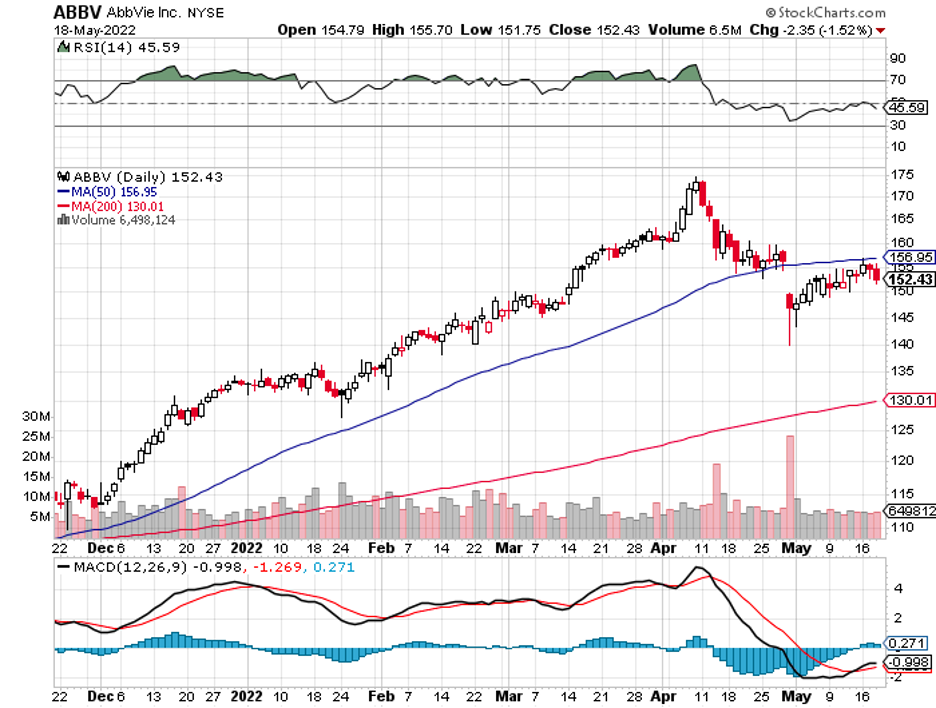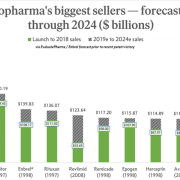A Positive Income Stock That Steadily Delivers
Even the most aggressive and high-risk investor would appreciate a passive income.
Now would be an excellent time to consider stocks that could offer robust returns throughout your lifetime for those with some cash stored up.
One stock that fits this description is AbbVie (ABBV).
Spun off from Abbott Labs (ABT) in 2013, AbbVie is widely recognized as a dependable Dividend King thanks to its 50-year track record of consecutive dividend increases. Since going solo, it has boosted its dividend by over 250%.
In the latest report, AbbVie’s annual dividend has reached $5.64 per share and is paid at a yield of 3.71%. This is roughly double the 1.86% long-term average of the S&P 500.
In the first-quarter earnings report, AbbVie’s year-over-year revenue climbed by 4.1% to reach $13.5 billion, pushing its earnings higher by 9%.
However, the company’s shares declined by approximately 10% after these results were released.
While the update wasn’t that disappointing, the impending patent loss of AbbVie’s top-selling rheumatoid arthritis drug Humira affected the market’s perception.
In fact, sales of Humira have already started to weaken, falling by 2.7% year-over-year to report $4.7 billion.
This report is hardly shocking, especially since the drug continues to battle it out against the generic competition.
Actually, Amgen (AMGN) and Biogen (BIIB) already have approved biosimilar versions of Humira out in the market since 2018.
Humira sales are anticipated to continue to fall in 2023 when the drug loses its patent exclusivity. Its competitors have started to apply for FDA approvals in the US for their biosimilars of this blockbuster treatment.
Another reason for the sell-off of AbbVie shares following its first-quarter results is the drop in sales of other products, particularly Imbruvica.
Since the competition in the oncology sector has become more intense, this treatment struggled to keep its share, resulting in a 7.4% decline in its revenue year-over-year to report $1.2 billion.
Although the decline in the sales of any company’s product is never a good sign, it should be noted that Imbruvica has been dealing with various issues even prior to this quarter.
In 2021, the global sales for Imbruvica only exhibited a meager 1.8% increase to reach $5.4 billion.
Like what happened in the first quarter of 2022, this unimpressive contribution also resulted from more intense competition.
The good news is that the critical products anticipated to offset the decline of Humira sales continue to reap excellent results.
AbbVie showed off a 21% year-over-year boost in revenue across its neuroscience and aesthetics segment, which was led by the solid performance of the recently launched migraine drug Ubrelvy as well as the in-demand Botox Cosmetic and Juvederm.
Meanwhile, momentum continues to grow for immunosuppressants Skyrizi and Rinvoq, which are projected to have practically all the major indications earned by Humira.
In the first quarter, Skyrizi sales went up 63.7% to reach $940 million while Rinvoq recorded a 53.6% increase to rake in $465 million.
Looking at their trajectory, both products are estimated to generate over $15 billion in sales in 2025.
These are promising numbers for AbbVie’s immunology segment. Plus, bear in mind that Humira actually hit peak sales in 2021 at $20.7 billion.
That means this treatment can still contribute meaningfully to the company. After all, it’s highly unlikely that Humira sales would immediately drop to zero just because generics start to infiltrate the US market.
Needless to say, AbbVie’s portfolio appears to be increasingly well-prepared for a post-Humira era.
Given that its revenue and earnings clearly show growth, and a strategy firmly in place to continue expanding its portfolio, AbbVie can easily sustain its yearly dividend boosts and offer passive income to its shareholders for many years.


